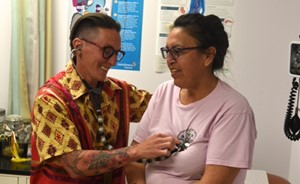Choosing a healthcare advocate
“I made sure that my spouse’s contact information was on my chart. I also had a note there with big bold letters, saying that if they needed consent, and I was unable to give it or too weak to sign the papers, he was the person they should contact. My mother was the first person that they contacted. It made me feel like I was back to being a child.”
An important part of any plan that you make about your wishes and preferences for healthcare when you’re no longer able to communicate yourself is naming someone who can speak and act for you.
Each province and territory has its laws regarding appointing this person and what they’re legally called. Some of the terms include substitute decision-maker, healthcare agent or proxy; health representative; or health, medical, or personal attorney.
Choosing someone to make healthcare decisions if you can’t because of illness or injury helps ensure that your wishes will be respected and followed. If you haven’t legally named someone to act in this role, physicians or other care providers may choose a member of your family of origin, an ex-spouse, or an adult child to act as your “substitute decision-maker.” If there is no one else who can act in this role, medical staff can make decisions.
“When I was intubated, hospital staff told me that they had consent from my next of kin. Luckily, I was well enough to write ‘who?’ They said, “Your parents said it’s okay.” I was furious. My parents were not the ones who needed to give permission. Hospital staff needed to talk to my spouse. It was a big issue for us during care.”
As a Two-Spirit & LGBTQ+ person, you shouldn’t assume that someone you would choose will be recognized and allowed to make decisions on your behalf. For example, if you have a spouse or common-law partner, this person is legally entitled to make these decisions. Still, if healthcare providers don’t know or recognize your relationship, they may choose someone else.
Ideally, your substitute decision-maker will know and follow your wishes and act to make sure that decisions reflect your beliefs and values.
Give careful thought in choosing this person, and spend the time to discuss your wishes in detail with them. If you’ve made an Advance Care Plan, be sure to share it with them since they will be legally bound to follow any instructions it contains. If you don’t have an Advance Care Plan, write your instructions and wishes down as clearly as possible. This will provide both of you with an opportunity to clear up any questions or confusion. Learn more by reading the article Making an advance care plan.
This person must have a good understanding of your wishes and their role, which may require them to interact on your behalf with care providers. Because many healthcare organizations are not 2SLGBTQ+ inclusive, this role may require strong advocacy skills. For example, your advocate might need to deal with issues such as misgendering; or who is “family,”; or who should be allowed to visit or be given information.
You may also want to choose a second person if the first person isn’t available for any reason. If you know and trust someone with medical or healthcare experience, who might be willing to be your advocate, consider asking them. Even if they’re not ready to act in this role, they may agree to informally consult, if needed, with the person you choose as your advocate.
Especially in situations where something unplanned occurs or where your medical condition changes suddenly, the better understanding your advocate has, the better they’ll be to act in your best interests. Consider discussing topics such as:
- Your beliefs and values in general and about end-of-life in particular.
- Your understanding of your rights as a patient or resident at a care centre.
- Your fears or worries about the treatment you might receive as a 2SLGBTQ+ person.
- How to find 2SLGBTQ+ inclusive care that provides respect and safety.
- Your preferences for care at home or elsewhere.
- Your wishes as to people you would or would not want to visit you or participate in caregiving.
- Your spiritual or religious beliefs and needs, if any.
- Your wishes about disclosure of personal or health information: Who may know what?
- Your wishes about levels of care, such as surgery, dialysis, antibiotics, feeding, oxygen, intubation, admission to ICU/CCU (intensive or critical care units), CPR (resuscitation), or DNR/AND (Do Not Resuscitate/Allow Natural Death) orders.
- Allies, resources, or supports that you may have.
- “What ifs”: It can be worth exploring possible outcomes or events that would require your advocate to make ‘life and death decisions.
Because these topics can be complex and stir up intense feelings, it’s a good idea to make written notes to help you and your advocate remember the details.
Be sure to check the legal requirements of the province or territory where you live when naming your healthcare advocate. If you move out of the province or territory where you’re now living, you may need to create a new agreement or change your existing one.
It’s best to consult with a lawyer or notary who can guide you and draw up a legally binding agreement. The person(s) you name must be notified. Once you have a completed agreement, make sure your advocate has the original or can access it easily. Keep this in mind if you travel.
Read more:
Videos
More Articles

Leaving a legacy

What does "2SLGBTQ+" mean?

Managing difficult situations

Planning ahead: Your wishes

How to be an ally

How to provide inclusive care to Two-Spirit & LGBTQ+ people

Getting the care that you need

About your grief

Finding 2SLGBTQ inclusive care

Making an advance care plan

Choosing a financial advocate

Making a will

Finding inclusive continuing care

Why inclusivity matters

For family, friends, and unpaid caregivers

Canadian Healthcare Bill of Rights

My Choices for Safe and Inclusive Healthcare
Featured Content

2SLGBTQ+ Canadian Healthcare Bill of Rights
Read More
MyGrief.ca Module - Grief in 2SLGBTQ+ communities
Read More
My Choices for Safe and Inclusive Healthcare
Read More
Planning for My Care
Read More
2SLGBTQ+ Knowledge Synthesis
Read More
Webinar: Improving access to respectful & inclusive care.
Read More
2SLGBTQ+ Canadian Healthcare Bill of Rights Infographic
Read More



